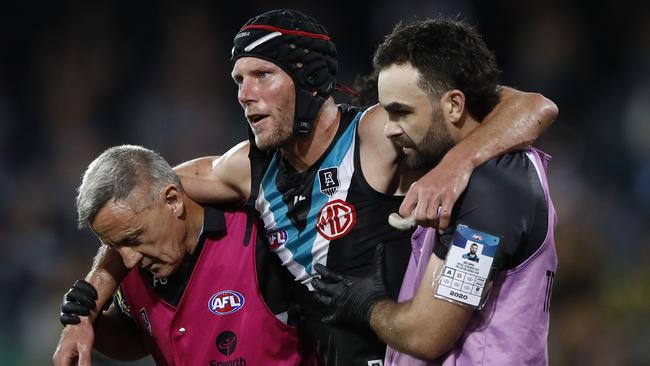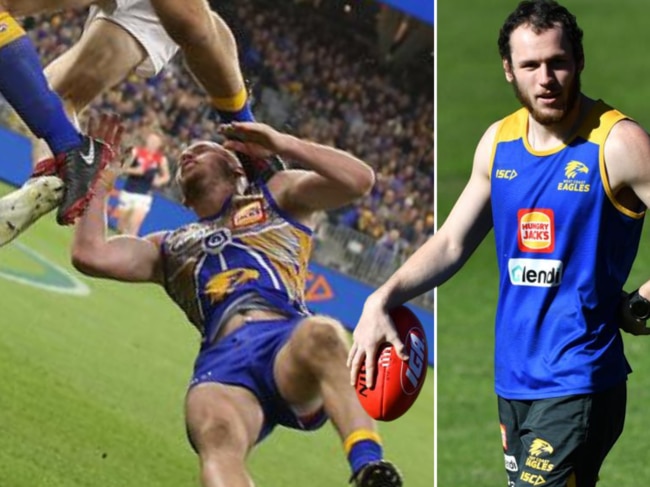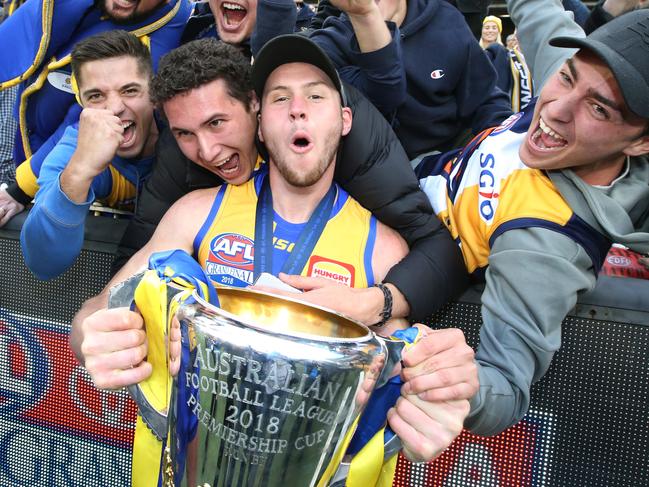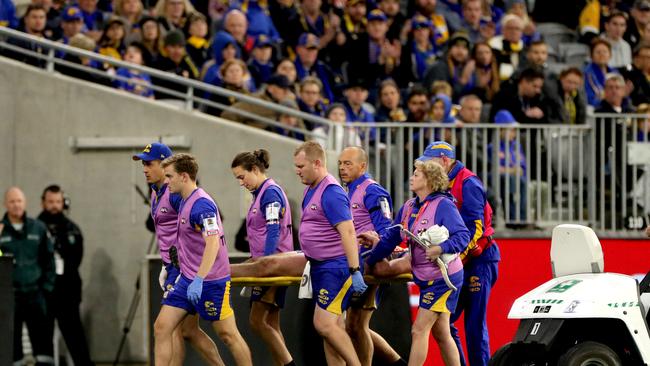Concussion: Carlton could soon become the first club to routinely scan the brains of its players
Carlton may soon become the first club to scan the brains of all AFL and AFLW players in a study that could prove a game changer for head knocks.
AFL
Don't miss out on the headlines from AFL. Followed categories will be added to My News.
Leading concussion campaigner Peter Jess says Carlton could soon become the first club to routinely scan the brains of all AFL and AFLW players at least twice a year in an effort to create a safer working environment.
Jess has been dealing closely with the Blues and the AFL by trying to lock in a study that he believes could be a game changer for head knocks and concussions.
Catch all the ICC T20 World Cup action live & exclusive to Fox Cricket, available on Kayo. New to Kayo? Start your free trial today.
It would require all players in the AFL and AFLW programs, as well as VFL players, to have at least one head scan in the pre-season as well as one at the end of every season.
They would also be required to undergo scans if they suffer a head knock during the season.
“We want to move into a position where we have agreed biomarkers for the structural and functional integrity of brains at the start of the season and then at the end of the season and after any clinical concussions in between,” Jess told News Corp.

“There has been high-level agreement (at Carlton), but the details have yet to be finalised.
“What Carlton are doing is that they want sign off from their doctors and from the AFL, which we are hopeful we will be able to get, as well as from the various health professionals who are going to deliver it.
“This would put Carlton at the forefront in terms of safety for players.”
Jess said Blues powerbrokers, including board member Greg Williams, who suffered numerous head knocks during his stellar career, had given their tentative support to the initiative.
“Greg (Williams) was supportive, (chief executive) Brain Cook was supportive, (president) Luke Sayers was supportive and (footy boss) Brad Lloyd was supportive,” Jess said.
“Everybody is driven to make the game safer and the only way we are going to do that is to have constant scrutiny.”
Jess said he spoke on Thursday with the AFL’s incoming chief medical officer Michael Makdissi to explain the concept behind his initiative.
He said neuroscientist and concussion expert Dr Alan Pearce would be a part of the scanning process.
Concussion crisis: Venables seeking more than just damages
Negotiations over a massive concussion damages payout to crippled West Coast Eagles premiership player Daniel Venables loom as a crucial test case for the AFL.
Venables, 22, became a teenage premiership player in just his 15th game in 2018 but suffered seven brain bleeds and an on-field seizure in a sickening collision in Round 9 the next season, which ended his career.
The fallen Eagle detailed his daily battle with migraines, anxiety, headaches, sleep deprivation, fatigue, head pain and eye pain in a tell-all interview with the Herald Sun in August.

He often sits under hot showers for long periods in an effort to find relief and was ultimately forced into retirement by an independent AFL medical panel.
“My life changed in a split second,” Venables told Channel 7 Perth on Thursday.
“That’s me for the rest of my life. I’ve lost my career. I live with mental health challenges, physical challenges.”
The Venables camp has estimated his losses in career earnings could top $6 million, plus ongoing expenses for total and permanent disablement.
But player agent and concussion campaigner Peter Jess said under the current AFL Players’ Association collective bargaining agreement, Venables was only likely to receive “in the order of $500,000 – which is clearly manifestly inadequate and unjust”.

There is no metric basis to support the AFL and AFLPA’s calculations to determine payments for a career ending injury, Jess said.
“Given he was a first-round draft pick, and a premiership player, Daniel’s career was tracking towards another decade of football at the elite level, with potential earnings of millions of dollars,” Jess said.
Venables met with AFL legal supremo Andrew Dillon and West Coast CEO Trevor Nisbett in Perth in the lead up to the Grand Final with further discussions to be held in the coming weeks.
Venables and his representatives are urging the league to mandate scans and baseline testing for all future draftees.

The former Eagle had a routine brain scan at Sunshine Hospital following a concussion in a Western Jets under 18s game, which proves his subsequent brain trauma is related directly to his AFL career.
Jess said Venables’ baseline scan before being drafted “enabled a direct, comparative analysis of the structural integrity of his brain pre and post the 2019 incident”.
“Therefore causation of his current impairment is not in question,” Jess said.
“It was clearly caused by his employment as an AFL football player.”
Venables told the Herald Sun in August: “No one (from the draft) gets scanned at the moment, but I think they should all be scanned. It is all about baseline testing.
“They should do it properly, sit there down for two-and-a-half hours and find out as much as they can before they enter the system.”
Associate Professor Alan Pearce from La Trobe University said he agreed “110 per cent” with Venables’ call to introduce baseline testing.
Dr Pearce has called for testing outside of the AFL system to ensure players receive “objective and independent” care.
Venables, the No. 13 pick in the 2016 draft, was the youngest Eagles premiership player in 2018 at age 19.




